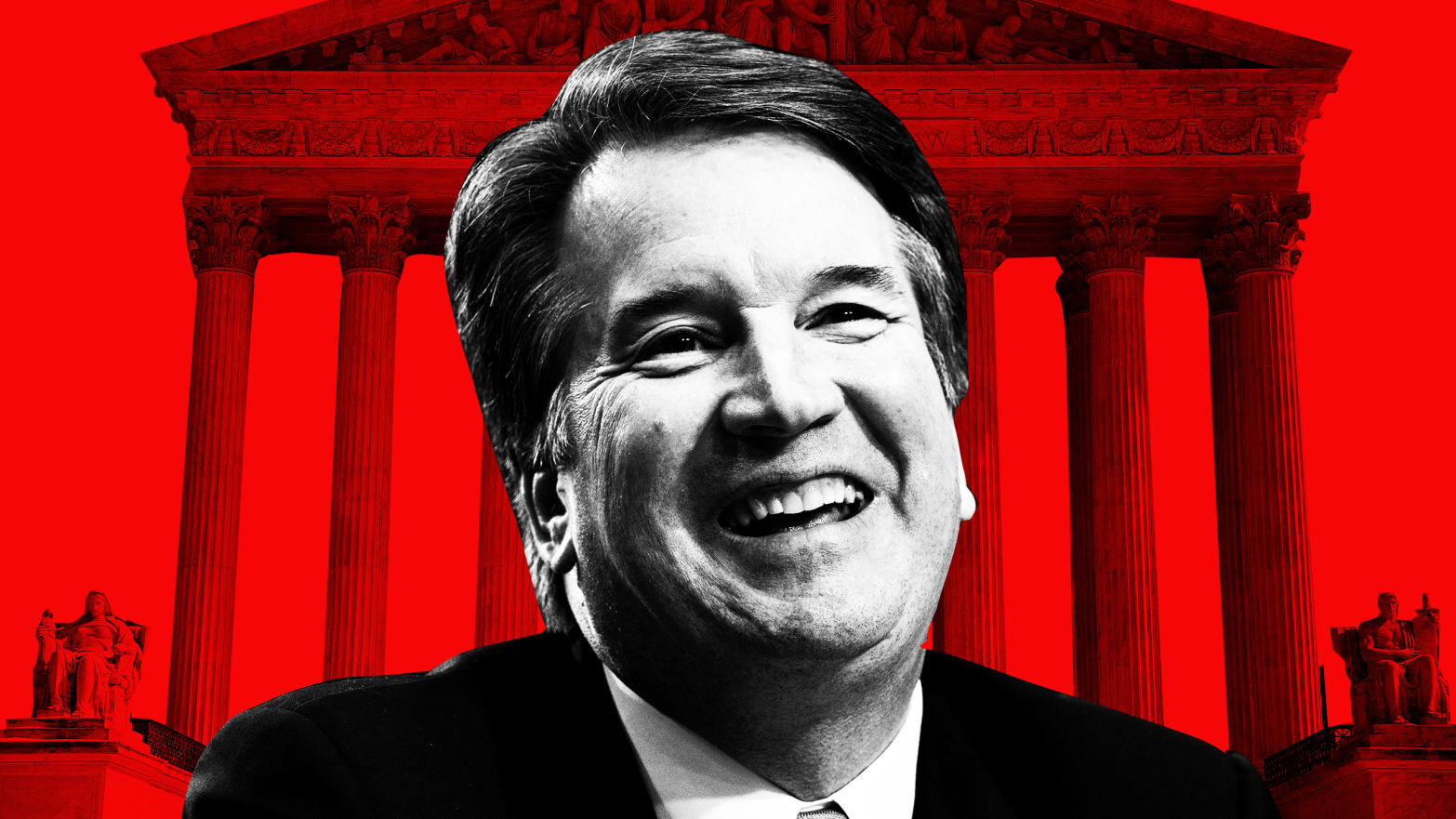Judge Brett Kavanaugh appeared headed for confirmation to the Supreme Court on Friday after a two critical senators both announced they would support him when the Senate holds the final vote on his nomination tomorrow.
Both Sens. Susan Collins (R-ME) and Joe Manchin (D-WV) announced their decisions to back Kavanaugh, ending days of speculation as to whether he would be able to cobble enough support together to make it across the finish line.
The announcements weren’t a completely surprise: both senators had voted to move forward with the nomination earlier in the day. But at least Collins’ announcement came with some drama.
The Senator walked into the chamber just before 3pm and signs quickly emerged suggesting that her vote for Kavanaugh would be in the affirmative. Three Senate Republican women — Joni Ernst (R-IA), Shelley Moore Capito (R-W.V.) and Cindy Hyde-Smith (R-MS) — took seats behind her, even though those weren’t their assigned desks. The Democratic side of the chamber remained nearly empty, with only five members bothering to watch the Maine Republican explain her vote.
About ten minutes after she arrived, Collins began to speak. First she attacked the “special interests” that she said opposed Kavanaugh before his name was announced, calling it part of a “gutter-level political campaign.” Then she worked meticulously through Kavanaugh’s judicial history, going to great lengths to frame his jurisprudence as mainstream.
It would be 25 minutes before Collins got to the allegations of sexual assault that threatened to derail his nomination.
But as soon as she approached that issue, which has torn the public apart in recent weeks, it became clear where she’d come down on it. Collins said she felt Dr. Christine Blasey Ford was sincere in her allegation that Kavanaugh sexually assaulted her in high school, but she expressed extreme skepticism about the case that had been made against Kavanaugh and even more reverence for the presumption of innocence.
"I do not believe that these charges can fairly prevent Judge Kavanaugh from serving on the court,” she said.
As Collins went point-by-point casting doubt on Ford’s claims, her male colleagues could not suppress their pleasure. Sen. Lindsey Graham (R-S.C.) nodded along approvingly. Sitting next to him, Sen. Tom Cotton (R-AR) offered up a cheshire cat grin. When Collins finally announced that she would be casting a yes vote, the two men exchanged the subtlest of fist bumps.
By then, the drama was largely gone and it was clear where Collins was going. When she was done, McConnell got up gingerly from his seat and walked over to shake her hand. Cornyn followed, as did Graham. And then came Chuck Grassley (R-IA), who had done more than any other senator to shepherd Kavanaugh through the Senate as chairman of the judiciary committee. He and Collins exchanged a warm hug.
Grassley said he had not known definitively where Collins would come down on the nomination before she spoke, though he had heard rumblings ten minutes or so prior. Asked if he was relieved, he replied, “of course.” Cornyn strolled out of the chamber and told reporters he was proud of Collins for “resisting intimidation” from the left. Collins, for her part, insisted that she had “struggled” with her decision “for a long time,” after a reporter noted it seemed like she had made up her mind a long time ago.
Shortly after she finished speaking, Manchin issued a press release announcing, he too, would support Kavanaugh.
“I have reservations about this vote given the serious accusations against Judge Kavanaugh and the temperament he displayed in the hearing and my heart goes out to anyone who has experienced any type of sexual assault in their life,” he said. “However, based on all of the information I have available to me, including the recently completed FBI report, I have found Judge Kavanaugh to be a qualified jurist who will follow the Constitution and determine cases based on the legal findings before him.”
Manchin, who is facing a tough reelection this year, added that he hoped Kavanaugh “will not allow the partisan nature this process took to follow him onto the court.” The lone Republican to oppose Kavanaugh, Lisa Murkowski of Alaska, called him a “good man” but “in my view, he’s not the best man for the court at this time.”
For the White House, Friday was a major triumph. In the hours leading up to Collins’s announcement, White House officials had felt anxiety about where she would land. White House Counsel Don McGahn, a Kavanaugh friend and sherpa for his nomination in the Senate, went up to Capitol Hill other officials, including Raj Shah, a senior White House communications hand. Top aides in the West Wing and in Republican senate offices were all but openly admitting they did not have the votes yet. Asked by The Daily Beast in the Senate if they had the votes then, McGahn simply shrugged and replied, “Well. I’m here.”
But within hours, confidence began to grow. And by the time Collins began her lengthy statement, Kavanaugh’s close friends and loyal allies were gloating.
“A big moment for the country, the Court the Constitution. This was deeply personal for many including me and I pray our country can heal from this disgusting and regrettable episode of partisan excess,” Matt Schlapp, the American Conservative Union chair and Trump surrogate, told The Daily Beast before Collins’s speech was even over.
The final vote on Kavanaugh’s nomination is expected to be Saturday evening, but the announcements on Friday lessens much, if not all, of the suspense. Friday also brought an end to a particular tense period for Senate Republicans who were not entirely sure where the fence-sitters were, even after the procedural vote in favor of Kavanaugh. After the vote, Senator Dianne Feinstein (D-CA) left the floor to walk back to her office. “That was a mistake,” she said.
Senators seemed palpably relieved on Friday to be largely done with the Kavanaugh confirmation process. Few could recall any debate as cantankerous, not even the ones surrounding Justice Clarence Thomas who was narrowly accepted or Robert Bork who was rejected. But despite a near universal agreement that the advice and consent process for Supreme Court nominees had become completely broken, no one had any clear idea of how to go about fixing it of whether it could ever get better.
“I’d like to return to” the days when nominees got 90 or so votes, Grassley told reporters. Asked how, he responded: “I don’t know. I don’t have an answer.”



